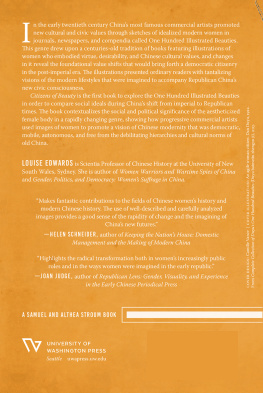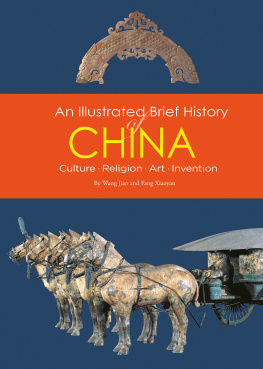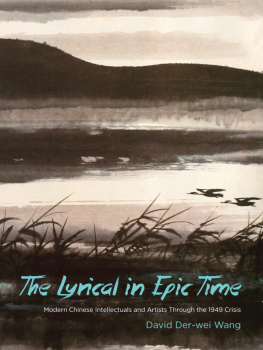
Modern Art for a Modern China
How did art reform fit into the many initiatives for social and cultural change that contributed to the New Cultural Movement that transformed the Chinese cultural landscape during the Republican period?
Modern art for a modern China was the rallying cry of Chinese intellectuals, many of whom were artists, critics, writers, poets and educators. Wang describes how these groups discussed and implanted changes in Chinas conception and practice of art. She demonstrates how art reforms fit into the many initiatives for social and cultural change that contributed to the New Cultural Movement that transformed the Chinese cultural landscape during the Republican period. In doing so, she analyses two key areas in the intellectual history of Republican China: Chinas art reform in the early decades of the twentieth century; and the connection and intersection between colonialism, nationalism and cosmopolitanism, including their direct impact on the development of art and art practice in China.
Modern Art for a Modern China is an invaluable resource for scholars and students of Chinas twentieth-century intellectual history and art history.
Yiyan Wang is Professor of Chinese at Victoria University of Wellington, New Zealand. Her research is in the field of modern Chinese literature and culture. She has been particularly interested in the interconnection between modern Chinese literature and art and between the writers and the artists.
Routledge Contemporary China Series
The Chinese Economy and its Challenges
Transformation of a Rising Economic Power
Charles C.L. Kwong
Keywords in Queer Sinophone Studies
Edited by Howard Chiang and Alvin K. Wong
Macau 20 Years after the Handover
Changes and Challenges under One Country, Two Systems
Edited by Meng U. Ieong
Doing Labor Activism in South China
The Complicity of Uncertainty
Darcy Pan
Chinese Energy Companies in Africa
Implications for the Foreign Policy of an Authoritarian State
Kasandra Behrndt-Eriksen
Chinas International Socialization of Political Elites in the Belt and Road Initiative
Theodor Tudoroiu
Regional Inequality in Transitional China
Haifeng Liao, Dennis Wei and Li Huang
Modern Art for a Modern China
The Chinese Intellectual Debate, 19001930
Yiyan Wang
For more information about this series, please visit: www.routledge.com/Routledge-Contemporary-China-Series/book-series/SE0768
Modern Art for a Modern China
The Chinese Intellectual Debate, 19001930
Yiyan Wang
First published 2021
by Routledge
2 Park Square, Milton Park, Abingdon, Oxon OX14 4RN
and by Routledge
52 Vanderbilt Avenue, New York, NY 10017
Routledge is an imprint of the Taylor & Francis Group, an informa business
2021 Yiyan Wang
The right of Yiyan Wang to be identified as author of this work has been asserted by her in accordance with sections 77 and 78 of the Copyright, Designs and Patents Act 1988.
All rights reserved. No part of this book may be reprinted or reproduced or utilised in any form or by any electronic, mechanical, or other means, now known or hereafter invented, including photocopying and recording, or in any information storage or retrieval system, without permission in writing from the publishers.
Trademark notice: Product or corporate names may be trademarks or registered trademarks, and are used only for identification and explanation without intent to infringe.
British Library Cataloguing-in-Publication Data
A catalogue record for this book is available from the British Library
Library of Congress Cataloging-in-Publication Data
Names: Wang, Yiyan, author.
Title: Modern art for a modern China : the Chinese intellectual debate, 19001930 / Wang Yiyan.
Description: Abingdon, Oxon ; New York : Routledge, 2021. | Includes bibliographical references and index. | Identifiers: LCCN 2020022242 (print) | LCCN 2020022243 (ebook) | ISBN 9780367312718 (hardback) | ISBN 9780429316005 (ebook)
Subjects: LCSH: Art and societyChinaHistory20th century. | Modernism (Aesthetics)China. | Cai, Yuanpei, 18681940. | ChinaHistoryMay Fourth movement, 1919. | ChinaIntellectual life20th century.
Classification: LCC N72.S6 W36 2021 (print) | LCC N72.S6 (ebook) | DDC 709.51/09041dc23
LC record available at https://lccn.loc.gov/2020022242
LC ebook record available at https://lccn.loc.gov/2020022243
ISBN: 978-0-367-31271-8 (hbk)
ISBN: 978-0-429-31600-5 (ebk)
Typeset in Times New Roman
by Newgen Publishing UK
For Scotte
Contents
The process of writing this book took place when I was to start my new job at Victoria University and trying to settle in the city of Wellington. In more than one way, I needed help and I have been most lucky to have made many friends in this coolest capital of the world, whose friendship and support have been invaluable for both my research and sanity. Gillian and Roderick, Carol and Mark, Amy and Tom are my extended family and I have travelled with them on many, different adventures, from marvellous cuisines to native gardens, from the New Zealand political landscape past and present to local community connections. Thanks to Gillians kindness and generosity in particular I now call New Zealand home and also thanks to her regular checking on the manuscripts progress, I am now able to present this book to the world.
It has been a great privilege to have known Rupert, Gary and James and I am extremely grateful for their openness to a cultural other like myself. They have certainly taken me onto different and yet equally interesting journeys of discovery and through them I came to see and appreciate the deep historical and cultural links between pakeha New Zealanders and their motherland. A special thank you should go to Rupert the drafts of my chapters were direct beneficiaries of his wide knowledge base, meticulous attention to detail and unfailing patience at deciphering my awkward English expressions.
I am also deeply indebted to many of my colleagues. John Clark, emeritus professor of Asian art history at the University of Sydney, offered crucial guidance, help and encouragement when I was conceptualising this project. In my school, the School of Languages and Cultures, Duncan Campbell, Catherine Churchman, Edwina Palmer, Richard Millington, each of these talented multilinguists helped me with their expertise in the language(s) and cultures in other parts of the world beyond my horizon. Their assistance has been invaluable and indispensable, as this research attempts to recover the global territories and historical timelines the Chinese intellectuals reached 100 years ago. Outside of my school, I am particularly grateful to three outstanding historians Alexander Maxwell, Charlotte McDonald and Sekhar Bandyopadhyay who are inspirations as well as scholarly models. They have been an enormous help in my attempt to transform myself from a literary critic to an intellectual historian. Peter Harris, the former director of Institute for Asian Studies at Victoria University, kindly spent time with me analysing the subtleties and nuances of what I intended to call the book and the title of this book was his brainchild.






